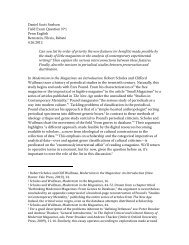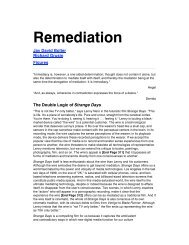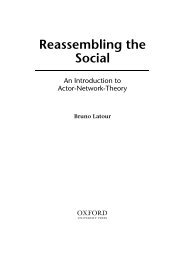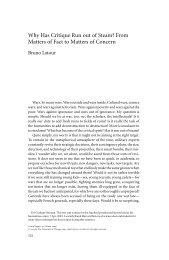- Page 2 and 3:
ARAMISTHE LOVE OF ECHNOLOGY
- Page 4 and 5:
Copyright © 1996 by the President
- Page 6 and 7:
TO SIMON SCHAFFER 7/
- Page 8 and 9:
By publishing this hook, I would li
- Page 10 and 11:
exemplary meditation on the difficu
- Page 13 and 14:
PROLOGUE: WHO KILLED ARAMIS?The fir
- Page 15 and 16:
PROLOGUE•cember 1987. A promising
- Page 17 and 18:
[DOCUMENT: EXCERPTS FROM AN ARTICLE
- Page 19 and 20:
"You see," he went on during one of
- Page 21 and 22:
"But during that period I found out
- Page 23 and 24:
-"There's one small problem," I sai
- Page 25 and 26:
1973: Test site at Orly; three-vehi
- Page 27 and 28:
1985: Scale model of two-car Aramis
- Page 29 and 30:
in a mass transit network, with no
- Page 31 and 32:
come true. Since every study has to
- Page 33 and 34:
load fa ctor, Professor? Your isola
- Page 35 and 36:
if by magic. An electronic calculat
- Page 37 and 38:
to be invented, if we are to track
- Page 39 and 40:
---) TransporterTime IS . ; To Char
- Page 41 and 42:
assembly line? You said "transfer"?
- Page 43 and 44:
primly, without acknowledging my cl
- Page 45 and 46:
defensive about playing "amusing me
- Page 47 and 48:
curves: DATAR, the RATP, Paris, bef
- Page 49 and 50:
fellow. It's like the Galileo affai
- Page 51 and 52:
Time To-1 2 3 4 5CJIII __ _ Time T1
- Page 53 and 54:
fic off the roads , it improve s tr
- Page 55 and 56: ter-who speaks in the name of the g
- Page 57 and 58: are solemnly and eternally committe
- Page 59 and 60: me, Aramis isn't a PRT Iype of tran
- Page 61 and 62: Aeroport de Paris said. IF you map
- Page 63 and 64: IS ARAMIS FEASIBLE?"Now we can go o
- Page 65 and 66: workshop, a control post, a recepti
- Page 67 and 68: the optical sensor so it will maint
- Page 69 and 70: evolutionary system of transportati
- Page 71 and 72: "For my part, " the motor declares,
- Page 73 and 74: -otherwise, it instructs the car to
- Page 75 and 76: not only determined the laws accord
- Page 77 and 78: [INTERVIEW EXCERPTS]M. Lamoureux, r
- Page 79 and 80: they have to change the motor, mult
- Page 81 and 82: there would be a lot of new functio
- Page 83 and 84: "The idea was that it was seductive
- Page 85 and 86: know who, among the engineers, exec
- Page 87 and 88: of admiring the architecture, the s
- Page 89 and 90: control room, by Ferbeck (who is al
- Page 91 and 92: has the massive dimensions it takes
- Page 93 and 94: come back to print. The whole passa
- Page 95 and 96: "Do you comprehend the crime, the u
- Page 97 and 98: [INTERVIEW EXCERPTS)At Matra headqu
- Page 99: [INTERVIEW EXCERPTS]M, Parlat, proi
- Page 102 and 103: Stationl00o
- Page 104 and 105: destinations: that's the idea that
- Page 108 and 109: [INTERVIEW EXCERPTS]M. Etienne, hea
- Page 110 and 111: ody can commit himself; it's imposs
- Page 112 and 113: configuration on the board. Besides
- Page 114 and 115: to the real transportation system,
- Page 116 and 117: As a young engineer, I refused to c
- Page 118 and 119: [INTERVIEW EXCERPTS)In M. Hector's
- Page 120 and 121: [INTERVIEW EXCERPTS]M. Parlat is sp
- Page 122 and 123: did his field work in the Amazon ra
- Page 124 and 125: What counts, in a technological pro
- Page 126 and 127: "That's an interesting theory all r
- Page 128 and 129: "With VAL, we moved gradually from
- Page 130 and 131: hard; you'd need to build it into t
- Page 132 and 133: also VAL; Ficheur, the contracting
- Page 134 and 135: completely ignores economic conditi
- Page 136 and 137: INTERPHASE :THRE E YEARS OF GRAC E"
- Page 138 and 139: construction of the Center for Tech
- Page 140 and 141: [INTERVIEW EXCERPTS]At the Ministry
- Page 142 and 143: every year?* You could pay for Aram
- Page 144 and 145: A "trashable explanation" ! The exa
- Page 146 and 147: II est passe par iciII repassera pa
- Page 148 and 149: uilding reliable, predictable, conv
- Page 150 and 151: public funds vampire-fashion and th
- Page 152 and 153: "Number 7 is incompatible with numb
- Page 154 and 155: "Yes, we 've made a lot of progress
- Page 156 and 157:
Orly-Val], and then Montpellier. We
- Page 158 and 159:
Norbert's sociology, he respected m
- Page 160 and 161:
"In fact, I should have spent a cou
- Page 162 and 163:
The rationality of technologies wri
- Page 164 and 165:
Why not go see Ronald Reagan, or th
- Page 166 and 167:
"I called several meetings to verif
- Page 168 and 169:
the World's Fair; then they said it
- Page 170 and 171:
attaching to me dozens of poor devi
- Page 172 and 173:
3. In 1973, in a beet field near th
- Page 174 and 175:
7 The control room for VAL in Lille
- Page 176 and 177:
1 I. Aramis really does exist now;
- Page 178 and 179:
] 5. [n March 1987, seven months be
- Page 180 and 181:
19. Since no engineer could prove m
- Page 182 and 183:
we are often the first to see, in a
- Page 184 and 185:
"The RATP said to itself, 'I'm behi
- Page 186 and 187:
agree. "They're aiming at VA L in s
- Page 188 and 189:
"He agrees with me," I remarked mod
- Page 190 and 191:
viewpoints, goals, and desires, so
- Page 192 and 193:
If the actors in a project define n
- Page 194 and 195:
With a technological project, inter
- Page 196 and 197:
gers impatient to show up at Bercy
- Page 198 and 199:
allies. Thus, not only is the actor
- Page 200 and 201:
from one extreme to another. If you
- Page 202 and 203:
isn't the only one who doesn't know
- Page 204 and 205:
"Aramis has a lot of advantages bec
- Page 206 and 207:
hour. The human being in these scen
- Page 208 and 209:
the subway, by virtue of its access
- Page 210 and 211:
even includes direct quotes! A prot
- Page 212 and 213:
Regie Autonome des TransportsParisi
- Page 214 and 215:
etween us had evaporated with Norbe
- Page 216 and 217:
ITY OF THE INDIVIDUALS AND COMPANIE
- Page 218 and 219:
opinion of the capitalists had "per
- Page 220 and 221:
An accusation that's so watered dow
- Page 222 and 223:
epistemological; it talks and talks
- Page 224 and 225:
conception, which exists in fact on
- Page 226 and 227:
put it. If Aramis existed, you woul
- Page 228 and 229:
"So we had to increase the absolute
- Page 230 and 231:
[SUMMARY OF A GROUP INTERVIEW]The s
- Page 232 and 233:
engineering, all the ingenuity, all
- Page 234 and 235:
"We've found the hidden staircase,"
- Page 236 and 237:
dominated by, people. But there is
- Page 238 and 239:
-Vehicle110,000f-PCC spervisio Stat
- Page 240 and 241:
[INTERVIEW EXCERPTS]-M. Freque, pro
- Page 242 and 243:
problem. This task, for the project
- Page 244 and 245:
"What I think is that the Matra eng
- Page 246 and 247:
"As for the automation, I agree wit
- Page 248 and 249:
inappropriate, as if it were clear
- Page 250 and 251:
PIaorm 1X" StationI / Plaorm 2Subst
- Page 252 and 253:
"Level III: the fixed equipment, ea
- Page 254 and 255:
But since you're not human, I'd be
- Page 256 and 257:
--wheels, supply information about
- Page 258 and 259:
little I was becoming the Aramis mo
- Page 260 and 261:
the cars located in the sector, as
- Page 262 and 263:
So it givesa recalibration that'sre
- Page 264 and 265:
OrdinateViewpoint of mobile unit/I-
- Page 266 and 267:
Phonic wheelCoded equidistant cross
- Page 268 and 269:
"Here deceleration has to be factor
- Page 270 and 271:
[DOCUMENT]code 5800 .2ORI 10 0 0 00
- Page 272 and 273:
Norbert woke up terrified.The next
- Page 274 and 275:
This is the case for the Matra comp
- Page 276 and 277:
This figure, in the context of the
- Page 278 and 279:
short-term vision. 'As long as ther
- Page 280 and 281:
1. What M. Brun needs; what hechoos
- Page 282 and 283:
ecause if someone says, 'After fift
- Page 284 and 285:
Well then, that's reassuring. I sta
- Page 286 and 287:
thing, give or take a nuance or two
- Page 288 and 289:
that's too bad Obviously, to go fro
- Page 290 and 291:
They sound awfully sure of themselv
- Page 292 and 293:
"Either they didn't put enough ener
- Page 294 and 295:
Phase 1: Concept development5phose
- Page 296 and 297:
VAL. You'll see, we're going to fin
- Page 298 and 299:
on on ongoing basis how things are
- Page 300 and 301:
7. Aramis has been perfected as a m
- Page 302 and 303:
of a network, to the extent that th
- Page 304 and 305:
"Are they interested in elected off
- Page 306 and 307:
"But then why not say it was resear
- Page 308 and 309:
when we talked about it. The electe
- Page 310 and 311:
"No, no, not enough love! Love and
- Page 312 and 313:
ahout each other in strict confiden
- Page 314 and 315:
"Yet in spite of its fragility, its
- Page 316 and 317:
to be a line. What more could I ask
- Page 318 and 319:
things. That's not what brought my
- Page 320 and 321:
"Obligation to use all appropriate
- Page 322 and 323:
" Prometheus. ""Prometheus! The 'sm
- Page 324 and 325:
GLOSSARYA-320 An airplane built by
- Page 326 and 327:
BertinBienvenueBus DivisionCabinent
- Page 328 and 329:
tems to be controlled in the car (d
- Page 330 and 331:
E:'2the ministry's technical dossie
- Page 332 and 333:
Porno 2000PrometheusPRTQuinRofoleRa
- Page 334 and 335:
sniffer planeSOFRESSOFRETUSouth lin
- Page 336:
BIUND /ATOUI , 01"""of SOOoIogy, £









